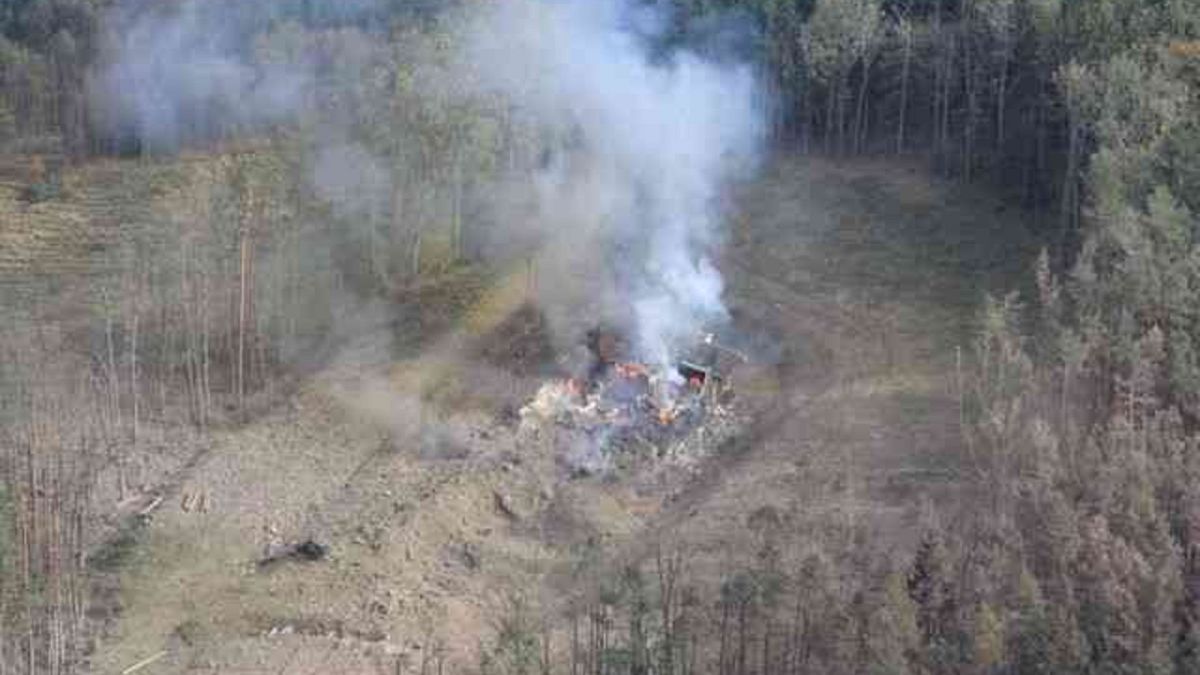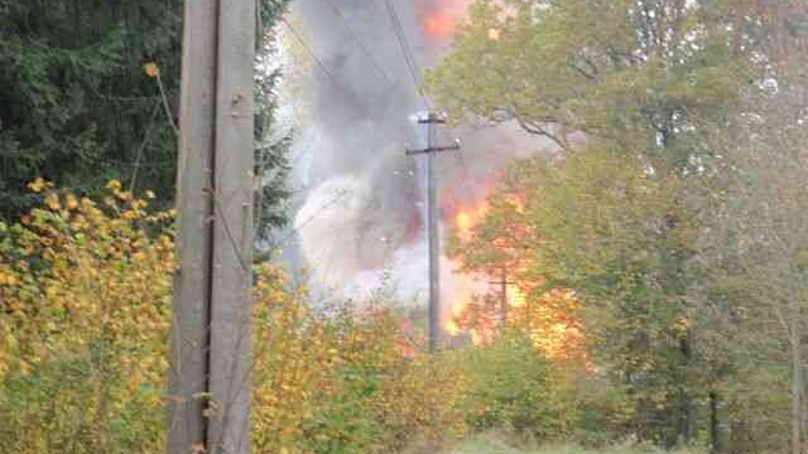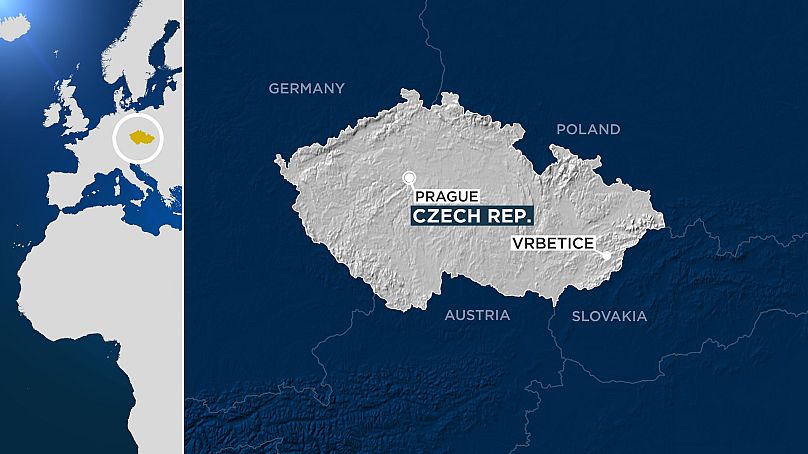Vrbetice, near the Czech Republic's border with Slovakia, is the last place you'd expect to play host to the murky world of international espionage.
Vrbetice, near the Czech Republic's border with Slovakia, is the last place you'd expect to play host to the murky world of international espionage.
The village, with a population of around 300, is set deep in the countryside of central Moravia, in the country's far east.
But things turned ugly in 2014 when a munitions depot at a former army complex of warehouses and factories jn the village -- sealed-off with barbed wire and “keep out” signs -- exploded in a towering fireball. Two employees were killed and much of the complex was levelled to the ground.
The blast was such that farmers in nearby fields were reportedly thrown to the ground. Debris scattered for miles around.
Just over a month later another storehouse, adjacent to the original site, exploded under equally mysterious circumstances, forcing 400 locals to be evacuated once again.
Initially, fingers were pointed at the private firm, Imex Group, that had rented the site since the mid-2000s from the Czech army.
Babis, the finance minister at the time, noted that another depot rented by the firm in Bulgaria had also exploded mysteriously years earlier, and he alleged that the company was blacklisted in the US for violating an arms embargo with the Democratic Republic of the Congo, an assertion that the firm rejected.
Imex Group threatened to sue Babis over his remarks, a warning that never ended up in the courts.
An end-of-year report by the Ministry of Interior in 2014 noted that investigations were ongoing, citing alleged “inappropriate storage” of munitions at the depot.
However, that’s when the case went cold and, it appeared, the short-lived drama in Vrbetice was either the result of malpractice or merely an accident.
“Back in 2014, there was not enough evidence due to the depots being completely destroyed. Therefore, the case was closed in 2015,” explained Pavel Havlicek, a research fellow at the Prague-based Association for International Affairs.
What is the link with Salisbury, England?
And it would remain closed for another three years until an unprecedented attack across the other side of Europe caught the eye of Czech investigators.
On March 4, 2018, in the small English cathedral city of Salisbury, two suspected agents from Russia’s GRU poisoned the former Russian military intelligence officer Sergei Skripal and his daughter.
Investigations by the British police, as well as the open-source investigative news outlet Bellingcat, revealed that the two suspected GRU (Russia’s military intelligence agency) agents were Ruslan Boshirov (real name Anatoliy Chepiga) and Alexandr Petrov (Alexander Mishkin).
For the Czech investigators, this was a lead they needed: The same names were allegedly given by two Russians who had visited a hotel near Vrbetice just before the explosion.
In late April this year, Bulgaria also announced it was investigating whether Russian agents were connected to explosions at a number of its munitions depots over the past decade.
It is believed that the munitions stored at the Vrbetice arms depot in 2014 were destined for Ukraine, which at the time was fighting a civil war following Russia’s annexation of Crimea.
Reports by local media, quoting intelligence sources, suggest that the shipments belonged to EMCO, a firm owned by the Bulgarian arms dealer Emilian Gebrev, who was poisoned in April 2015, just months after the explosion in the Czech Republic.
An investigation in 2019 by Bellingcat asserted that a senior GRU officer, Denis Sergeev (aka “Sergey Fedotov”), was in Bulgaria at the time of Gebrev’s poisoning, which he survived.
Sergeev is also alleged to have been in the UK around the time of the Salisbury poisonings.
Police and journalists have linked the GRU’s military unit 29155, a top-secret intelligence squad, and its 20-or-so agents to Russia’s annexation of Crimea in 2014, destabilisation campaigns in Moldova the same year, and a failed coup in Montenegro in 2016.
Prague points the finger at Moscow
However, it wasn't until April 17, 2021, that the Czech Republic accused Russia of being behind the explosion in Vrbetice, prompting the most serious diplomatic incident the country has known for decades.
Prime Minister Andrej Babis said in a late-night press conference there was “unequivocal evidence” the GRU was behind the attack. Meanwhile, Milos Vystrcil, president of the Czech Senate, called it “state terrorism”.
Czech authorities subsequently expelled dozens of Russian diplomats, many of whom were believed to be intelligence officers working at the Russian embassy. Several EU states did so as well in solidarity. Moscow retaliated by expelling almost the entire staff of the Czech embassy in Russia.
The story took a fresh twist on Friday when local Czech media reported that Petr Bernatik Jr., head of the Imex Group, had the day before the explosion stopped for at least 40 minutes close to the hotel where the alleged GRU agents were staying near Vrbetice, according to his mobile phone GPS records which are now being investigated by the authorities.
Bernatik had also made an impromptu and solo visit to the depot the same day, which local newspapers quoted former staff members saying was unusual.
Unanswered questions
But despite the case being brought out into the light and new information emerging on a daily basis, basic questions remain.
Like what actually happened in 2014? Why did it take so long for the Czech authorities to publicly allege the Russian connection and why was it revealed when it was, amid already heightened Czech-Russia tensions?
Havlicek says it could be explained by it taking until autumn 2020 to clean the explosion site, after which the authorities could restart their investigations.
“Since then, several rounds of investigation and criminology have taken place, which is why we only know more now,” he noted.
Yet eyebrows have been raised as to why PM Babis announced the news when he did on April 17.
The announcement came just days before Interior Minister Jan Hamacek was set to visit Moscow to discuss procuring Russian-made COVID-19 vaccines. Hamacek had to cancel his visit after the news.
And it came just days after pro-Western foreign minister Tomas Petricek was sacked from the position. This was chiefly because Petricek a week earlier had waged an unsuccessful challenge to Hamacek for leadership of the Social Democrats (CSSD), the junior partner in the ruling coalition.
However, Petricek also had a long-running feud with the Czech Republic’s pro-Russian President, Milos Zeman. It was believed at the time by analysts that Petricek’s dismissal opened up more space for Zeman to interfere in foreign policy decisions.
Zeman, a prime minister during the 2000s, became the loudest champion of pro-Russia and pro-China relations after being elected president in 2013. He has publicly defended Russian actions in Ukraine and opposed Western sanctions on Moscow.
In 2018, one Czech analyst described Zeman as “the most influential Kremlin ally in Central Europe.
The country’s main opposition parties, the Pirate Party and the Civic Democrats (ODS), now strongly back the pro-West establishment view, opening up a political divide not between Westwards or Eastwards-looking politicians, but also between liberal and authoritarian.
For the Western-orientated politicians, they are fulfilling the liberal democratic instincts of the Czechoslovak founders when the state was created in 1918 and when, seventy-one years later, it threw off communism.
Jakub Janda, of the European Values Center for Security Policy, a Prague-based think tank, recently told DW the alleged Russian attack on the Vrbetice depot is the “most hostile attack on Czech territory since the Soviet invasion of 1968”, a reference to the “Prague Spring”, when Soviet troops invaded Czechoslovakia to oust its reform-minded communist leadership.
Although hostile since the end of communism in 1989, Czech-Russian relations took a turn for the worse in early 2020. Prague city officials removed a statue of the Russian World War II hero, Soviet Marshal Ivan Konev, and renamed the square in front of the Russian Embassy after the slain Russian dissident Boris Nemtsov.
Just days after Babis announced the Russian connection, President Zeman publicly said he thought there was “no evidence” of Russian agents being tied to the blast at the Vrbetice ammunition depot.
He has since pressured the authorities to investigate other possible causes of the explosion, despite the government publicly stating that its investigators have “unequivocal evidence” of a Russian connection.
“The fight over the interpretation of the whole affair is not over,” said Jiri Pehe, a political analyst and a director of New York University´s Prague campus.
Justice Minister Marie Benesova, an ally of Zeman’s, went after Attorney General Pavel Zeman (unrelated to the President) because he briefed journalists about the investigation.
Although PM Babis protected him against Benesova, said Pehe, Attorney General Zeman resigned last week, citing political pressure.
However, for much of Czech-Russian relations, the die has already been cast. Diplomats have been expelled. The government has rallied around the message that Russia was behind the Vrbetice attack. And the fallout has already impacted Russia’s long-term interests in Central Europe.
Trade Minister Karel Havlicek announced in late April that Russian energy firm Rosatom will be banned from bidding to be a contractor for the planned €6 billion Dukovany nuclear power plant, the most expensive Czech infrastructure project to date. This is after a Chinese firm was also excluded over safety concerns.
Every weekday, Uncovering Europe brings you a European story that goes beyond the headlines. Download the Euronews app to get a daily alert for this and other breaking news notifications. It's available on Apple and Android devices.




